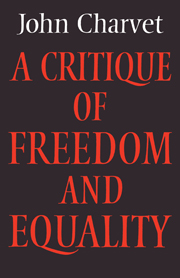Summary
THE EQUAL VALUE OF INDIVIDUALS AS SELF-DETERMINING BEINGS
The modern moral idea holds or presumes that the source of moral value lies in human beings themselves and not in some meta-human principle. The importance of the notions of freedom and equality in modern ethical thought consists in their being a joint principle expressing this idea in a particular form, a form which understands the value of human beings to reside in each individual as such. The joint principle affirms the equal value of all men as self-determining beings, that is to say their equal value in respect of their being choosers of the particular ends they pursue in their lives.
By the source of moral worth here is meant that principle which bestows moral legitimacy on the particular choices and actions of individuals. Individuals are presumed to be, as already indicated, self-forming beings, in that they choose particular ends to pursue in their lives. Thus the notion that the individual himself is the source of the legitimacy of his own particular choices for his life means that by virtue of his making such choices he bestows at least prima facie1 moral worth upon them. His worth consists in his self-determining capacity, or his freedom. The position involves then a distinction between the particular individual, the individual in respect of the actual choices he makes for his life, and the individual in respect of his pure capacity to make such choices.
- Type
- Chapter
- Information
- A Critique of Freedom and Equality , pp. 11 - 116Publisher: Cambridge University PressPrint publication year: 1981

